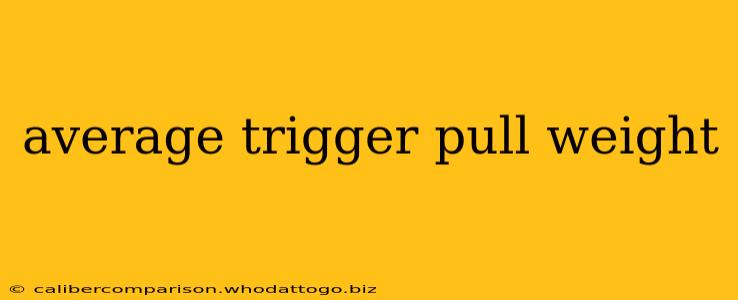The average trigger pull weight varies significantly depending on the firearm type, manufacturer, and even individual units. Understanding trigger pull weight is crucial for safety, accuracy, and overall shooting performance. This guide dives deep into the average weights, factors influencing them, and what constitutes a good or bad pull weight for different applications.
What is Trigger Pull Weight?
Trigger pull weight refers to the amount of force, measured in pounds, required to pull the trigger and release the firing pin, ultimately discharging the firearm. A lighter trigger pull generally means less force is needed, while a heavier trigger pull requires more. This seemingly simple measurement has profound implications for shooting.
Average Trigger Pull Weights by Firearm Type:
It's impossible to give a single "average" because the variation is so substantial. However, we can look at typical ranges:
Handguns:
-
Pistols (Self-defense/Target): The average trigger pull weight for self-defense or target pistols often falls between 4 and 6 pounds. However, competition pistols can have significantly lighter pulls (under 3 pounds) due to their specialized design. Heavier pulls are generally less desirable for self-defense, as they can hinder quick target acquisition and accurate shots under stress.
-
Revolvers: Revolvers tend to have heavier trigger pulls, typically ranging from 8 to 12 pounds. This is partly due to their double-action mechanisms (requiring more force to cock the hammer and release the firing pin simultaneously).
Rifles:
-
Sporting Rifles (Hunting/Target): Sporting rifles may have trigger pulls ranging from 2 to 6 pounds, depending on the model and intended use. Lighter pulls are preferred for precision shooting, while hunting rifles might have slightly heavier pulls for increased safety.
-
Tactical Rifles: Tactical rifles, used in law enforcement and military applications, often have adjustable triggers allowing for customizable pull weights, typically in the 3 to 5-pound range.
-
Bolt-Action Rifles: These rifles frequently boast adjustable triggers enabling customization to meet a shooter's preferences.
Shotguns:
-
Hunting Shotguns: Trigger pull weight on hunting shotguns is typically between 4 and 7 pounds. The weight is a balance between safety and the ability to shoot quickly.
-
Tactical Shotguns: Similar to tactical rifles, tactical shotguns may have adjustable triggers and generally fall within the 3 to 6-pound range.
Factors Affecting Trigger Pull Weight:
Several factors contribute to variations in trigger pull weight:
- Firearm Design: The internal mechanics of the firearm, including the trigger mechanism's complexity and spring tension, significantly impact the trigger pull.
- Manufacturer: Different manufacturers have different standards and designs, leading to variations in trigger pull weight.
- Individual Units: Even within the same model and manufacturer, individual firearms can exhibit slight variations in trigger pull weight due to manufacturing tolerances.
- Trigger Adjustments: Many modern firearms offer adjustable triggers, allowing users to customize the pull weight to their preferences.
- Ammunition Type: While less direct, the type of ammunition used might subtly influence the perceived trigger pull weight due to recoil and other factors.
What Constitutes a "Good" or "Bad" Trigger Pull Weight?
The ideal trigger pull weight depends largely on the intended use.
- Too Light: An excessively light trigger can lead to accidental discharges if not handled with extreme care.
- Too Heavy: A heavy trigger pull can slow down reaction time, reduce accuracy, especially under stress, and lead to fatigue during extended shooting sessions.
- Consistency: Consistent trigger pull weight is more critical than the exact weight. A consistently predictable trigger is more conducive to accurate shooting than one that varies significantly from shot to shot.
Conclusion: Importance of Professional Assessment
Determining the ideal trigger pull weight is a nuanced process. For optimal safety and shooting performance, consulting with a certified firearms professional or gunsmith is recommended. They can help assess your individual needs, evaluate your firearm's trigger, and offer guidance on adjustments or modifications if necessary. Always prioritize safety when handling firearms and prioritize professional assistance for modifications or repairs.

